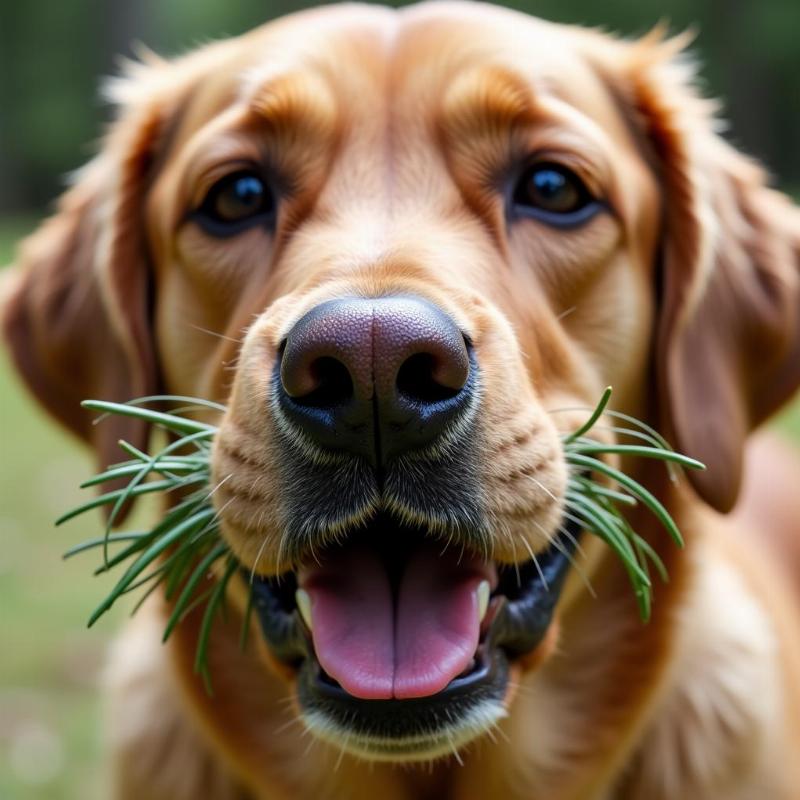Pine needles are a common sight in many American yards, especially during the holiday season. But are they safe for our canine companions? Many dog owners wonder about the potential dangers lurking in their festive décor, and pine needles are often a top concern. The short answer is: it’s complicated. While pine needles themselves aren’t highly toxic, they can present several risks to dogs.
Understanding the Risks of Pine Needles for Dogs
While not acutely toxic like some plants, pine needles can still pose problems for your furry friend. Chewing on them can cause gastrointestinal irritation, leading to vomiting and diarrhea. The sharp needles can also puncture the intestinal lining, a serious veterinary emergency.  Dog with pine needles in its mouth Furthermore, the oils from pine trees can be irritating to a dog’s mouth and skin, causing drooling, skin rashes, or even allergic reactions.
Dog with pine needles in its mouth Furthermore, the oils from pine trees can be irritating to a dog’s mouth and skin, causing drooling, skin rashes, or even allergic reactions.
The Dangers of Pine Oil
Pine oil, present in many household cleaners and some types of pine needles, can be particularly problematic. If ingested, it can cause stomach upset, drooling, and lethargy. In more severe cases, it can lead to liver damage. Keep all pine-scented cleaning products securely stored away from your pets.
Protecting Your Dog from Pine Needle Hazards
Protecting your dog from pine needle hazards is relatively straightforward. Regularly sweep or vacuum pine needles from your yard and indoors if you have a Christmas tree. Consider using a pet-safe tree alternative, or if you opt for a real tree, secure it firmly to prevent tipping. Supervise your dog closely when they are around pine trees or decorations. Train your dog to “leave it” when they approach pine needles or other potentially hazardous items.
Christmas Tree Safety Tips
Christmas trees, while festive, present additional risks beyond just pine needles. Ornaments can be choking hazards, and water in the tree stand can contain bacteria and preservatives that are harmful if ingested. Cover the tree stand water and ensure ornaments are securely fastened and out of your dog’s reach. subcutaneous injection sites in dogs
What to Do If Your Dog Ingests Pine Needles
If your dog ingests pine needles, monitor them closely for any signs of distress, such as vomiting, diarrhea, lethargy, or loss of appetite. If you observe any of these symptoms, contact your veterinarian immediately. are pine needles bad for dogs Early intervention is crucial to preventing potential complications.
Veterinary Treatment Options
Your veterinarian may induce vomiting if the ingestion was recent or administer activated charcoal to absorb the toxins. In some cases, supportive care, such as fluids and medication to manage symptoms, may be necessary. dog and cat christmas tree
Are Artificial Pine Trees Safer?
While artificial trees eliminate the risk of pine oil and needle ingestion, they still pose some hazards. Dogs can chew on and swallow pieces of artificial needles or branches, potentially causing blockages. Always supervise your dog around artificial trees and consider using a barrier to prevent access. is pine straw good for dog bedding
Dr. Emily Carter, DVM, at Paws & Claws Veterinary Clinic in Austin, Texas, advises: “Prevention is key. Taking simple steps to make your home and yard safe can protect your dog from the potential hazards of pine needles.”
Dr. Mark Johnson, a certified veterinary toxicologist, adds: “While most cases of pine needle ingestion are not life-threatening, they can cause significant discomfort and potential complications. Always err on the side of caution and contact your veterinarian if you have any concerns.” acupuncture points for dogs chart
Conclusion
Pine needles, while a beautiful part of the holiday season, can present risks to dogs. By understanding these risks and taking proactive steps, you can ensure your furry friend enjoys a safe and happy holiday season. Remember, a little prevention goes a long way in protecting your beloved pet.
FAQ
-
Are all types of pine needles equally dangerous for dogs? While the level of toxicity can vary slightly between species, all pine needles pose potential risks.
-
Can pine needles get stuck in a dog’s paws? Yes, especially the longer, sharper needles. Check your dog’s paws after walks in areas with pine trees.
-
What are the signs of pine oil poisoning in dogs? Drooling, vomiting, lethargy, difficulty breathing, and tremors.
-
Is pine straw safe for dogs? Pine straw can be less of a risk than needles, but it can still cause irritation if ingested.
-
Are there any dog-safe Christmas tree alternatives? Yes, consider a felt tree, a wooden tree, or a metal tree.
-
Can dogs be allergic to pine trees? Yes, some dogs can have allergic reactions to pine oil or pollen.
-
What should I do if my dog eats a pine cone? Contact your veterinarian, as pine cones can cause blockages.
Beautdogs.us is your trusted source for comprehensive and engaging information on dog care and companionship in the USA. We offer expert advice on dog breeds, grooming, nutrition, and training. Whether you’re a new dog owner or a seasoned pro, Beautdogs.us is your go-to resource for all things dog-related. Contact us at [email protected] or +1 501-555-7529 for more information.